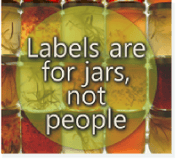What’s In A Name?
~ Brian Sherman, PhD, Center for Motivation and Change
“By continuing to use the term “addict” and “alcoholic,” treatment providers are doing a disservice to their patients and potentially negating progress towards destigmatization and successful long-term treatment.”
 What’s in a name? Sure, by any other name a rose may smell so sweet, but by any other name would an “addict” feel so stigmatized? Were Shakespeare alive today I would ask that he reconsider his stance. With the gradual pace of change in addiction treatment highlighted by the continued advancement and implementation of evidence-based treatments, why is the field so far behind in not using more clinically appropriate and de-stigmatizing — albeit a bit cumbersome – language such as: “person with a substance use disorder” or “person suffering from addiction”? It has been years now that the field of clinical psychology did away with stigmatizing terms such as “schizophrenic”, “manic-depressive”, or “autistic.” Why then does the field of addiction remain so far behind?
What’s in a name? Sure, by any other name a rose may smell so sweet, but by any other name would an “addict” feel so stigmatized? Were Shakespeare alive today I would ask that he reconsider his stance. With the gradual pace of change in addiction treatment highlighted by the continued advancement and implementation of evidence-based treatments, why is the field so far behind in not using more clinically appropriate and de-stigmatizing — albeit a bit cumbersome – language such as: “person with a substance use disorder” or “person suffering from addiction”? It has been years now that the field of clinical psychology did away with stigmatizing terms such as “schizophrenic”, “manic-depressive”, or “autistic.” Why then does the field of addiction remain so far behind?
As an addiction psychologist I do not discourage my patients for whom the term “addict” works. If it motivates them to change, fantastic. For many people, the term “addict” is a helpful way of identifying symptoms and issues, and finding a way to connect and bond with others in a healthy way that promotes change. However, when that term creates a prolonged sense of failure or guilt which ultimately may lead to relapse (negative emotions are one of the strongest predictors of relapse) or prevent someone from seeking help in the first place (because they don’t want to accept the label, and the stigma that is associated with it), I question its utility.
People are people first, before they develop an addiction. Just as they are people before they develop heart disease, diabetes, or depression. The “addict” label suggests the whole person is the problem, rather than the problem being the problem. A person with a substance abuse problem has a far better chance at recovery than a person who is the problem him or herself at their core. It is no one’s fault that the term “addict” and “alcoholic” continue to permeate daily news stories dispersed to mass audiences, even though they are not diagnostic terms. It is the fault of the treatment community who fail to promote a new language, one of compassion and accuracy. Treating the whole person means respecting other aspects of the individual, including the positive traits and skills that promote change and personal growth.
Why, then, does a label like “addict” or “alcoholic” continue to be so prevalent in our society today? Somehow, the term “addict” (and all its associations) satisfies our need to justify a person’s unfathomable use of drugs in the face of great success or great consequence (see Philip Seymour Hoffman, and countless less famous people who succumb to substance dependence). The evidence does suggest that compulsive behaviors can alter the pleasure, reward, and executive functioning systems of the brain, making it nearly impossible to resist the morning use that staves off sickness, however, the reasons for continued use, or relapse, are far more complex still. By simplifying those choices down to “addict behavior” we are not allowing other factors (i.e. genetics, family environment, trauma, etc.) their due, and we are not seeing the individual as a whole person.
We must move beyond these stigmatizing labels to a more accurate and sensitive language. By continuing to use the term “addict” and “alcoholic” treatment providers are doing a disservice to their patients and potentially negating progress towards destigmatization and successful long-term treatment. To my colleagues in the addiction field, please take this step of eliminating the words “addict” and “alcoholic” from the field and let us continue progressing towards a more accurate, kind, and effective treatment environment. Because, what’s in a name does matter.
Dr. Sherman is a clinical psychologist with specialized training in relational psychodynamic psychotherapy, Dialectical Behavior Therapy (DBT), and Cognitive Behavioral Therapy (CBT) with a focus on treating anxiety, depression, personality disorders, and substance abuse.
Source: Center for Motivation & Change (used with permission)
………………….![]()
Sponsor: 2014 SMART Recovery Annual Conference
